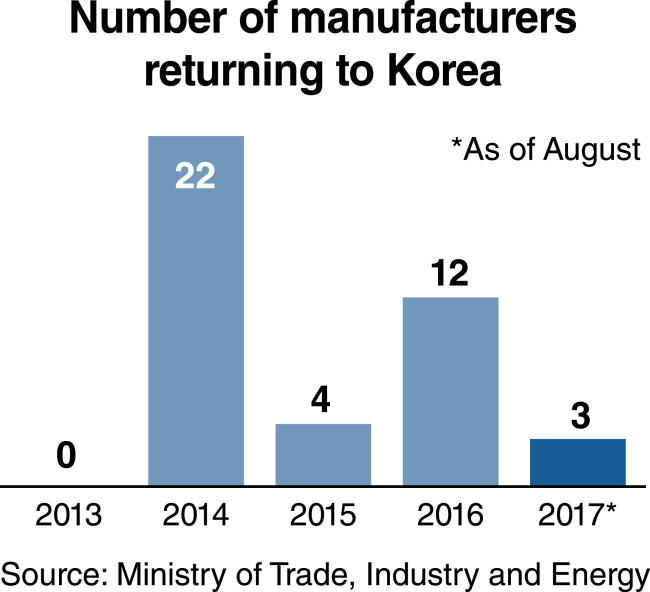Few Korean companies have brought home overseas production in recent years in contrast to a sharp rise in the number of the country’s firms operating abroad.
In 2012, the government began strengthening measures to facilitate the reshoring of manufacturing companies. Since then, just 41 Korean manufacturers have transferred overseas factories back to the country, according to data from the Ministry of Trade, Industry and Energy.
During the same period, more than 17,000 Korean businesses have gone abroad, setting up local subsidiaries and branches, showed figures compiled by the Export-Import Bank of Korea.
Critics say previous efforts to bring home Korean manufacturers operating abroad have been far from substantial and effective.
Less than half of the companies that have returned home have received financial support. The total amount of subsidies given to them over the past five years is a mere 22.4 billion won ($19.7 million), or an average of 1.2 billion won each.
As of the end of 2016, only two manufacturers had benefited from tax breaks worth 360 million won after returning home.
A law was enacted in 2013 at the initiative of the Park Geun-hye administration to provide a more systemic support for the reshoring of Korean firms.
Since then, however, an interministerial committee formed to draw up and carry out detailed measures has held no meeting.
In a survey of companies that have brought home production, conducted by a local research institute earlier this year, about 50 percent said they were dissatisfied with government support provided to them, with slightly over 23 percent expressing satisfaction.
“The reshoring policy of the Park administration was all about slogans, lacking firm will and concrete substance,” said Rep. Park Jae-ho, a lawmaker of the ruling Democratic Party of Korea, who sits on the parliamentary trade and industry committee.

President Moon Jae-in’s government announced in July it would provide manufacturers moving back to the country the same benefits that have been offered to foreign-invested firms here.
But experts say it is still hard to expect a significant rise in the reshoring of companies, as the Moon administration has been pushing for a set of measures that they say will increase corporate costs and do little to ease anti-business sentiment in the country.
Corporate concerns have deepened that labor costs will soar due to a steep rise in the minimum wage, a planned reduction in working hours and court rulings to widen the scope of ordinary wages.
Labor market conditions are expected to become more rigid following last month’s decision to repeal measures introduced last year under the previous administration to make layoffs and changes to working conditions easier.
Moon and his economic advisers have recently pledged to push for deregulation in new industries as part of efforts to spur innovation-driven growth, which they hope will supplement their initial drive for income-led growth.
But the Moon administration still remains reluctant to carry out sweeping regulatory reforms across the board.
In a government survey of 3,377 Korean manufacturers running factories abroad this year, only five, or 0.4 percent of the 1,299 respondents, said they were considering moving production back to the country.
In addition to the need to go directly into overseas markets, they cited high production costs, limited domestic demands and a complex set of regulations as reasons for being passive toward reshoring.
Many Korean manufacturers operating in China are considering transferring production facilities to Southeast Asian countries rather than back home to cope with Beijing’s economic reprisals against Seoul’s hosting of an advanced US anti-missile system.
Experts say efforts should be redoubled to facilitate the reshoring of Korean manufacturers, which is needed to shore up weakening investment and employment at home.
According to data from Statistics Korea, facility investment in the country increased 13.2 percent in August, down from 25.1 percent in the previous month. The increase rates might have been lower, excluding investments in the booming semiconductor sector.
Korea’s unemployment rate grew at the rapidest pace in August among member states of the Organization for Economic Cooperation and Development, due mainly to deteriorating youth joblessness.
The figures released by the OECD put Korea’s unemployment rate for August at 3.8 percent, up 0.2 percentage point from the previous month, the highest, alongside Austria, among the 25 OECD members surveyed.
The country’s youth unemployment rate stood at 10.7 percent in August, up 1.3 percentage point from July and second-highest after Portugal’s 1.6 percentage point gain.
According to government data, the number of new jobs created by reshoring manufacturers -- all of which were small and midsized ones -- over the past five years remained at a mere 837 as of the end of last year.
SMEs in the manufacturing sector reduced domestic investments from 14.9 trillion won in 2014 to 12.1 trillion won in 2016, while increasing overseas investments from 1.63 trillion won to 6.15 trillion won over the cited period.
Moon Jong-chul, an analyst at the Institute for Industrial Policy Studies, called for an improvement in the scheme to support reshoring firms, particularly large manufacturers, which could create more jobs and added value.
He suggested allowing companies to be entitled to receive a package of support without requiring them to dispose of all production facilities abroad, and lifting restraints on building factories in areas surrounding Seoul.
“The fundamental solution will be to enhance the overall business environment in the country,” he said, stressing the importance of regulatory reforms and transparent policy that could more than offset negative effects of rising wages.
By Kim Kyung-ho (khkim@heraldcorp.com)







![[Today’s K-pop] Blackpink’s Jennie, Lisa invited to Coachella as solo acts](http://res.heraldm.com/phpwas/restmb_idxmake.php?idx=644&simg=/content/image/2024/11/21/20241121050099_0.jpg)